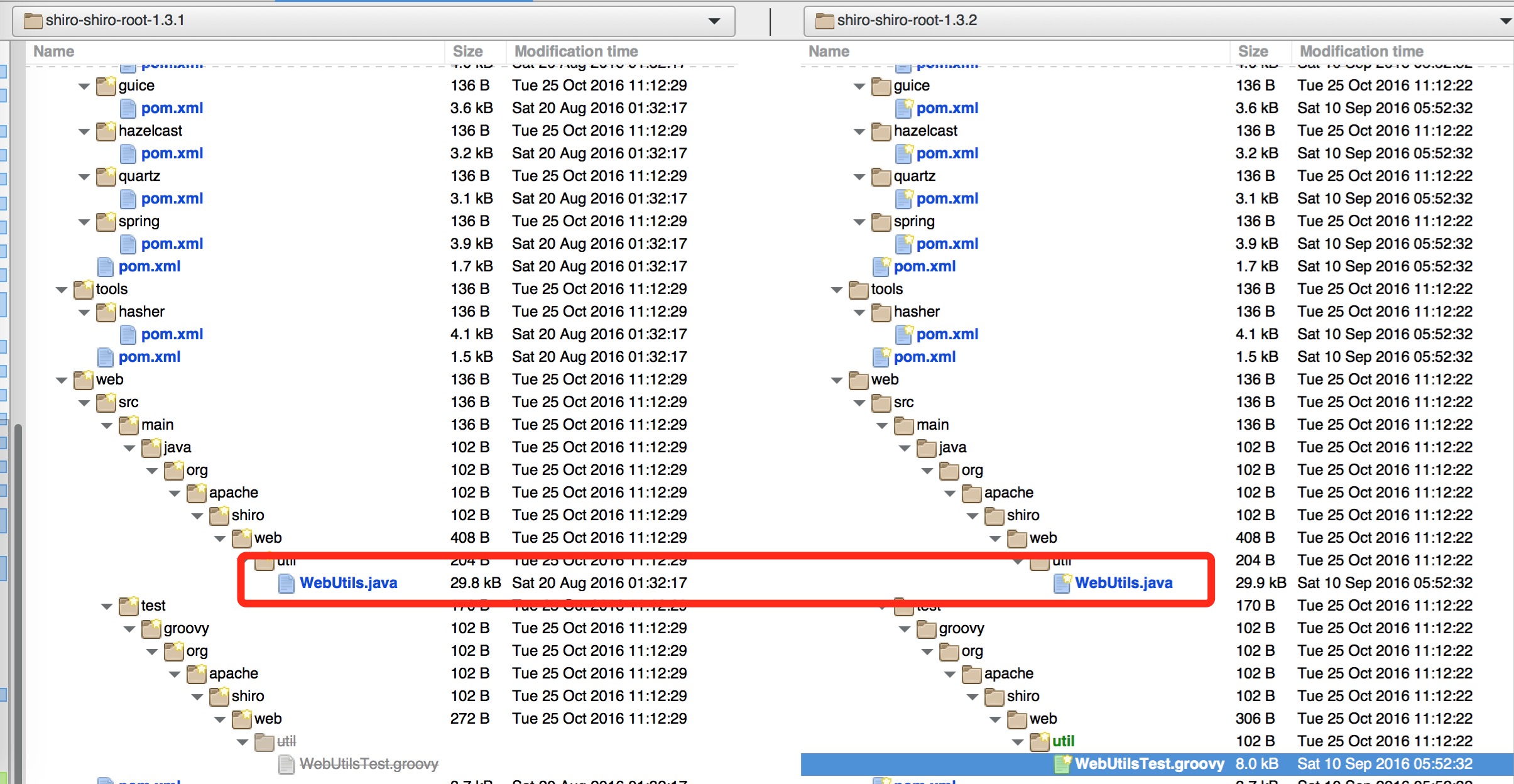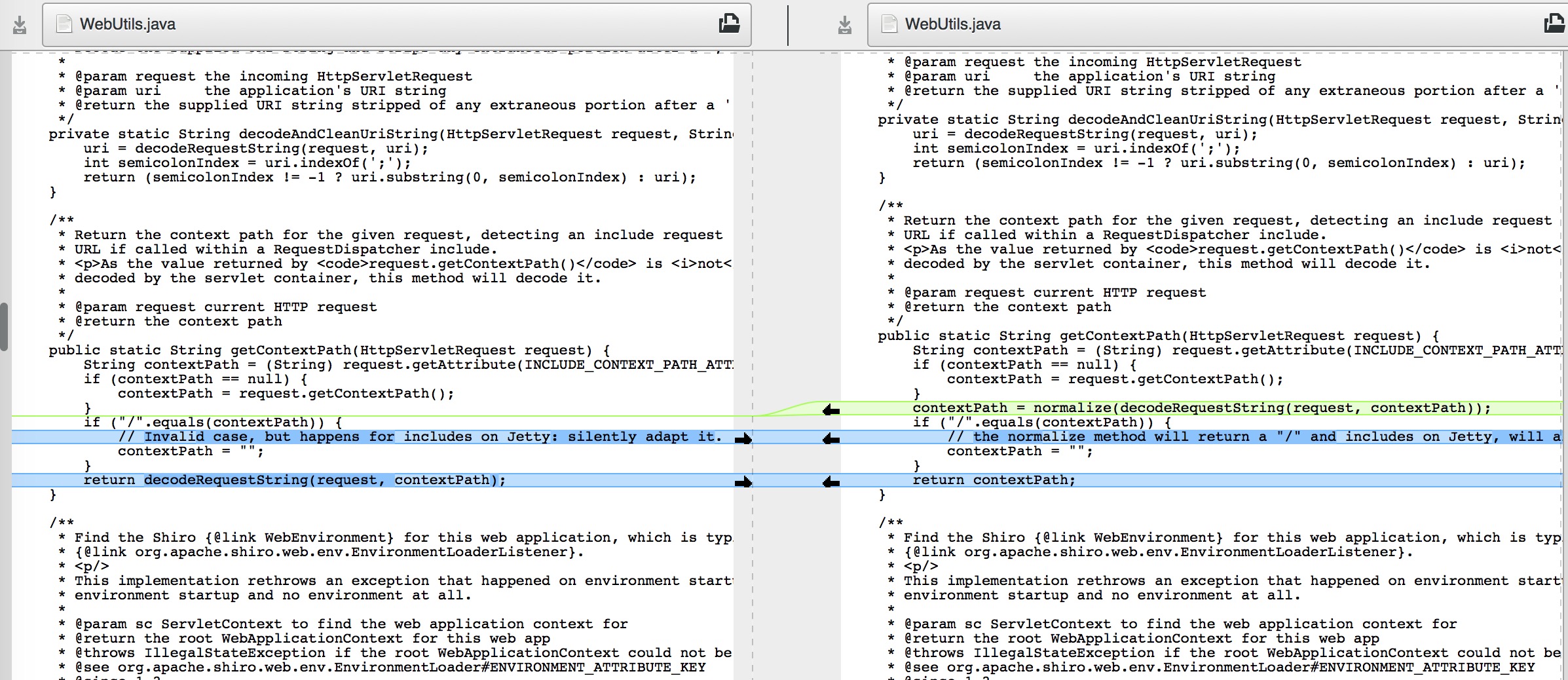Vulnerabilities > CVE-2016-6802 - Improper Access Control vulnerability in Apache Shiro 1.3.1
Attack vector
NETWORK Attack complexity
LOW Privileges required
NONE Confidentiality impact
NONE Integrity impact
HIGH Availability impact
NONE Summary
Apache Shiro before 1.3.2 allows attackers to bypass intended servlet filters and gain access by leveraging use of a non-root servlet context path.
Vulnerable Configurations
| Part | Description | Count |
|---|---|---|
| Application | 1 |
Common Weakness Enumeration (CWE)
Common Attack Pattern Enumeration and Classification (CAPEC)
- Embedding Scripts within Scripts An attack of this type exploits a programs' vulnerabilities that are brought on by allowing remote hosts to execute scripts. The attacker leverages this capability to execute scripts to execute his/her own script by embedding it within other scripts that the target software is likely to execute. The attacker must have the ability to inject script into script that is likely to be executed. If this is done, then the attacker can potentially launch a variety of probes and attacks against the web server's local environment, in many cases the so-called DMZ, back end resources the web server can communicate with, and other hosts. With the proliferation of intermediaries, such as Web App Firewalls, network devices, and even printers having JVMs and Web servers, there are many locales where an attacker can inject malicious scripts. Since this attack pattern defines scripts within scripts, there are likely privileges to execute said attack on the host. Of course, these attacks are not solely limited to the server side, client side scripts like Ajax and client side JavaScript can contain malicious scripts as well. In general all that is required is for there to be sufficient privileges to execute a script, but not protected against writing.
- Signature Spoofing by Key Theft An attacker obtains an authoritative or reputable signer's private signature key by theft and then uses this key to forge signatures from the original signer to mislead a victim into performing actions that benefit the attacker.
Nessus
NASL family Fedora Local Security Checks NASL id FEDORA_2016-2939D70CF4.NASL description update to 1.3.2, security fix for CVE-2016-6802 Note that Tenable Network Security has extracted the preceding description block directly from the Fedora update system website. Tenable has attempted to automatically clean and format it as much as possible without introducing additional issues. last seen 2020-06-05 modified 2016-11-15 plugin id 94781 published 2016-11-15 reporter This script is Copyright (C) 2016-2020 and is owned by Tenable, Inc. or an Affiliate thereof. source https://www.tenable.com/plugins/nessus/94781 title Fedora 25 : shiro (2016-2939d70cf4) code #%NASL_MIN_LEVEL 80502 # # (C) Tenable Network Security, Inc. # # The descriptive text and package checks in this plugin were # extracted from Fedora Security Advisory FEDORA-2016-2939d70cf4. # include("compat.inc"); if (description) { script_id(94781); script_version("2.3"); script_set_attribute(attribute:"plugin_modification_date", value:"2020/06/04"); script_cve_id("CVE-2016-6802"); script_xref(name:"FEDORA", value:"2016-2939d70cf4"); script_name(english:"Fedora 25 : shiro (2016-2939d70cf4)"); script_summary(english:"Checks rpm output for the updated package."); script_set_attribute( attribute:"synopsis", value:"The remote Fedora host is missing a security update." ); script_set_attribute( attribute:"description", value: "update to 1.3.2, security fix for CVE-2016-6802 Note that Tenable Network Security has extracted the preceding description block directly from the Fedora update system website. Tenable has attempted to automatically clean and format it as much as possible without introducing additional issues." ); script_set_attribute( attribute:"see_also", value:"https://bodhi.fedoraproject.org/updates/FEDORA-2016-2939d70cf4" ); script_set_attribute(attribute:"solution", value:"Update the affected shiro package."); script_set_cvss_base_vector("CVSS2#AV:N/AC:L/Au:N/C:N/I:P/A:N"); script_set_cvss3_base_vector("CVSS:3.0/AV:N/AC:L/PR:N/UI:N/S:U/C:N/I:H/A:N"); script_set_attribute(attribute:"plugin_type", value:"local"); script_set_attribute(attribute:"cpe", value:"p-cpe:/a:fedoraproject:fedora:shiro"); script_set_attribute(attribute:"cpe", value:"cpe:/o:fedoraproject:fedora:25"); script_set_attribute(attribute:"vuln_publication_date", value:"2016/09/20"); script_set_attribute(attribute:"patch_publication_date", value:"2016/09/17"); script_set_attribute(attribute:"plugin_publication_date", value:"2016/11/15"); script_set_attribute(attribute:"generated_plugin", value:"current"); script_end_attributes(); script_category(ACT_GATHER_INFO); script_copyright(english:"This script is Copyright (C) 2016-2020 and is owned by Tenable, Inc. or an Affiliate thereof."); script_family(english:"Fedora Local Security Checks"); script_dependencies("ssh_get_info.nasl"); script_require_keys("Host/local_checks_enabled", "Host/RedHat/release", "Host/RedHat/rpm-list"); exit(0); } include("audit.inc"); include("global_settings.inc"); include("rpm.inc"); if (!get_kb_item("Host/local_checks_enabled")) audit(AUDIT_LOCAL_CHECKS_NOT_ENABLED); release = get_kb_item("Host/RedHat/release"); if (isnull(release) || "Fedora" >!< release) audit(AUDIT_OS_NOT, "Fedora"); os_ver = pregmatch(pattern: "Fedora.*release ([0-9]+)", string:release); if (isnull(os_ver)) audit(AUDIT_UNKNOWN_APP_VER, "Fedora"); os_ver = os_ver[1]; if (! preg(pattern:"^25([^0-9]|$)", string:os_ver)) audit(AUDIT_OS_NOT, "Fedora 25", "Fedora " + os_ver); if (!get_kb_item("Host/RedHat/rpm-list")) audit(AUDIT_PACKAGE_LIST_MISSING); cpu = get_kb_item("Host/cpu"); if (isnull(cpu)) audit(AUDIT_UNKNOWN_ARCH); if ("x86_64" >!< cpu && cpu !~ "^i[3-6]86$") audit(AUDIT_LOCAL_CHECKS_NOT_IMPLEMENTED, "Fedora", cpu); flag = 0; if (rpm_check(release:"FC25", reference:"shiro-1.3.2-1.fc25")) flag++; if (flag) { security_report_v4( port : 0, severity : SECURITY_WARNING, extra : rpm_report_get() ); exit(0); } else { tested = pkg_tests_get(); if (tested) audit(AUDIT_PACKAGE_NOT_AFFECTED, tested); else audit(AUDIT_PACKAGE_NOT_INSTALLED, "shiro"); }NASL family Fedora Local Security Checks NASL id FEDORA_2016-744DF45727.NASL description update to 1.3.2, security fix for CVE-2016-6802 Note that Tenable Network Security has extracted the preceding description block directly from the Fedora update system website. Tenable has attempted to automatically clean and format it as much as possible without introducing additional issues. last seen 2020-06-05 modified 2016-09-23 plugin id 93672 published 2016-09-23 reporter This script is Copyright (C) 2016-2020 and is owned by Tenable, Inc. or an Affiliate thereof. source https://www.tenable.com/plugins/nessus/93672 title Fedora 24 : shiro (2016-744df45727) code #%NASL_MIN_LEVEL 80502 # # (C) Tenable Network Security, Inc. # # The descriptive text and package checks in this plugin were # extracted from Fedora Security Advisory FEDORA-2016-744df45727. # include("compat.inc"); if (description) { script_id(93672); script_version("2.4"); script_set_attribute(attribute:"plugin_modification_date", value:"2020/06/04"); script_cve_id("CVE-2016-6802"); script_xref(name:"FEDORA", value:"2016-744df45727"); script_name(english:"Fedora 24 : shiro (2016-744df45727)"); script_summary(english:"Checks rpm output for the updated package."); script_set_attribute( attribute:"synopsis", value:"The remote Fedora host is missing a security update." ); script_set_attribute( attribute:"description", value: "update to 1.3.2, security fix for CVE-2016-6802 Note that Tenable Network Security has extracted the preceding description block directly from the Fedora update system website. Tenable has attempted to automatically clean and format it as much as possible without introducing additional issues." ); script_set_attribute( attribute:"see_also", value:"https://bodhi.fedoraproject.org/updates/FEDORA-2016-744df45727" ); script_set_attribute(attribute:"solution", value:"Update the affected shiro package."); script_set_cvss_base_vector("CVSS2#AV:N/AC:L/Au:N/C:N/I:P/A:N"); script_set_cvss3_base_vector("CVSS:3.0/AV:N/AC:L/PR:N/UI:N/S:U/C:N/I:H/A:N"); script_set_attribute(attribute:"plugin_type", value:"local"); script_set_attribute(attribute:"cpe", value:"p-cpe:/a:fedoraproject:fedora:shiro"); script_set_attribute(attribute:"cpe", value:"cpe:/o:fedoraproject:fedora:24"); script_set_attribute(attribute:"vuln_publication_date", value:"2016/09/20"); script_set_attribute(attribute:"patch_publication_date", value:"2016/09/22"); script_set_attribute(attribute:"plugin_publication_date", value:"2016/09/23"); script_set_attribute(attribute:"generated_plugin", value:"current"); script_end_attributes(); script_category(ACT_GATHER_INFO); script_copyright(english:"This script is Copyright (C) 2016-2020 and is owned by Tenable, Inc. or an Affiliate thereof."); script_family(english:"Fedora Local Security Checks"); script_dependencies("ssh_get_info.nasl"); script_require_keys("Host/local_checks_enabled", "Host/RedHat/release", "Host/RedHat/rpm-list"); exit(0); } include("audit.inc"); include("global_settings.inc"); include("rpm.inc"); if (!get_kb_item("Host/local_checks_enabled")) audit(AUDIT_LOCAL_CHECKS_NOT_ENABLED); release = get_kb_item("Host/RedHat/release"); if (isnull(release) || "Fedora" >!< release) audit(AUDIT_OS_NOT, "Fedora"); os_ver = pregmatch(pattern: "Fedora.*release ([0-9]+)", string:release); if (isnull(os_ver)) audit(AUDIT_UNKNOWN_APP_VER, "Fedora"); os_ver = os_ver[1]; if (! preg(pattern:"^24([^0-9]|$)", string:os_ver)) audit(AUDIT_OS_NOT, "Fedora 24", "Fedora " + os_ver); if (!get_kb_item("Host/RedHat/rpm-list")) audit(AUDIT_PACKAGE_LIST_MISSING); cpu = get_kb_item("Host/cpu"); if (isnull(cpu)) audit(AUDIT_UNKNOWN_ARCH); if ("x86_64" >!< cpu && cpu !~ "^i[3-6]86$") audit(AUDIT_LOCAL_CHECKS_NOT_IMPLEMENTED, "Fedora", cpu); flag = 0; if (rpm_check(release:"FC24", reference:"shiro-1.3.2-1.fc24")) flag++; if (flag) { security_report_v4( port : 0, severity : SECURITY_WARNING, extra : rpm_report_get() ); exit(0); } else { tested = pkg_tests_get(); if (tested) audit(AUDIT_PACKAGE_NOT_AFFECTED, tested); else audit(AUDIT_PACKAGE_NOT_INSTALLED, "shiro"); }
Seebug
| bulletinFamily | exploit |
| description | > Apache Shiro before 1.3.2 allows attackers to bypass intended servlet filters and gain access by leveraging the use of a non-root servlet context path. #### shiro in the path control, the attacker can bypass the filter to access filtered path, the impact of the version shrio <1.3.2  #### From the above figure it is clear to the latest version of the modified code, as follows  #### Official repair process The latest 1. 3. 2 version for the request url processing to add the `contextPath = normalize(decodeRequestString(request, contextPath)); ` i.e., the first of the url to decode, then back to normal, next enter the treatment process. #### POC For example, an ordinary user access the admin account path will appear when 403, this time using the burp cut off, then the access path of the added last`%2f`, both can be bypassed shiro detection. Because for the browser to say that`%2f `will be automatically encoded as`/`, but the burp truncated after entering the shiro, the shiro does not decode it, so it can be bypassed. |
| id | SSV:92540 |
| last seen | 2017-11-19 |
| modified | 2016-11-17 |
| published | 2016-11-17 |
| reporter | 秋海棠 |
| title | Apache Shiro remote security restriction bypass Vulnerability, CVE-2016-6802) |
References
- http://packetstormsecurity.com/files/138709/Apache-Shiro-Filter-Bypass.html
- http://packetstormsecurity.com/files/138709/Apache-Shiro-Filter-Bypass.html
- http://www.securityfocus.com/archive/1/539397/100/0/threaded
- http://www.securityfocus.com/archive/1/539397/100/0/threaded
- http://www.securityfocus.com/bid/92947
- http://www.securityfocus.com/bid/92947